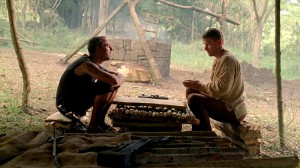Lost – “Across the Sea”
Oh, it’s like they’re talking us about our expectations of and reactions to the show!
“Across the Sea” has been a fairly polarizing episode. And as Damon Lindelof has sagely pointed out: “Wait. ‘Polarizing’ is a BAD thing?” And he’s right. Polarizing isn’t a bad thing. It encourages discussion and debate and argument (and people to leave rude comments on major TV critics’ blogs) that helps us, in theory, come together about an issue or text. Sure it can start flame wars, but it can also aid in understanding, and I like to think we’re all civil enough to engage in these types of discussion, even on the Internet (despite the Greater Internet Fuckwad Theory).
Indeed, the reaction to “Across the Sea” has been as varied as I imagine the reaction to “Exposé” was. And that’s great. These types of episodes ultimately help us figure out what we expect the show to be about. Mythic archetypes or personal stories? Running through the jungle, shooting and exploding things or sitting in the jungle, contemplating the nature of man? It’s these types of episodes that tell us, ultimately, more about ourselves than it tells us about the show.
Me? I was just bored.
I didn’t hate “Across the Sea” but I didn’t particular like it either. And I think this speaks about what I come to show with now, and that is, essentially, that I don’t have theories about the show any longer. I stopped theorizing about this, that, and everything around season 3, giving myself over to the writers and Darlton. I realized that hours spent figuring out things meant or were, while fun, wasn’t ultimately where my enjoyment was derived from. As I’ve contended in the past, the reason why Lost has worked so well compared to the other serialized shows with a central mystery driving them is that Lost, at the end of the day, was about its characters (the Lost-clones being about the mystery instead). And that, at the end of the day, is where I find my enjoyment.
Needless to say, I was excited by the prospect of a Jacob and Man in Black episode (especially after Richard’s rather lackluster episode), and perhaps my excitement is what did me in. The episode’s uber-prequel mentality is what ultimately did it in for me. I understand why the show went there, it’s necessary to answer particular questions, especially about THE SOURCE, I didn’t feel it was essential to defining who Jacob and the Man in Black are.
While I appreciate that Jacob and the Man in Black (at this point, is withholding his name THAT essential to the narrative?) were show as having more human qualities from their seemingly god-like abilities, the episode, because it has to do an answer dump, doesn’t give the characters time to breathe. Indeed, MiB says the group of people he joins are selfish and manipulative, but we never see that. He just tells us. Which, in terms, reaffirms his mother’s position (more on Allison Janney’s mother in a moment). Jacob, on the other hand, is unwilling and petulant, which explains much of his attitude about things and how he treats people. Despite their seeming omnipotence (something that I guess comes with immortality), they’re still just two brothers who can’t reconcile their emotions and upbringings.
Which isn’t surprising given their mother. The very definition of an abject maternal figure, Mother is controlling, manipulative, and prone to bringing two young boys to a glowing cave and saying “Look, but don’t touch.” The Mother’s placement in the show’s mythology, that she is the one who is responsible for all of this suffering that’s been going on for centuries, isn’t exactly a great place for the to position her, especially considering, as Maureen Ryan notes, that show hasn’t been terribly kind to female characters. And inserting a truly abject mother into the mix is no way to shore up that image.
The episode, ultimately, violates that cardinal rule of screenwriting: show, don’t tell. The episode never shows us; it just tells us, and that’s the fault of the series. At this point, because the show has, to a large degree, become about the mysteries (but especially this season) it has no choice but to tell because showing doesn’t explain mysteries. You have to do the “Here’s what happen…”. With only 3 and half hours left in the story, I hope for a lot more showing than telling and more character.
FINAL THOUGHTS
- I’m always happy to see Allison Janney in anything, but even I felt like she thought a lot of her dialog was clunky and bad, and struggled to make it work. On the other hand, I felt like Kenton Duty (young Jacob) and Ryan Bradford (young MiB) were really captivating, especially Bradford.
- I didn’t really need those scenes from season 1. Despite the attempts at matches in the editing, it still felt like it was put in by execs worried no one would get that connection.
- Know I said I would address Smocke as the Big Bad this week, but it didn’t work with the episode. Hoping for next week.
- Be sure to check out Myles’ critical round up of the episode for other reactions.
- May 12, 2010
- Noel
- Episode Review
- Lost


